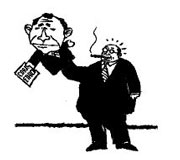For weeks, headlines have been obediently following the White House’s Message-a-Day folks: “BUSH URGES CORPORATE CLEANUP.” “FINANCIAL SWAT TEAM SOUGHT.” And so on.
Fish, guns, barrels. What to write? What to write?
You probably know about Harken Energy, the Texas firm whose 1989 insider dealing by CEO Dubya netted the then-president’s son $850,000—chump change, really, when compared to Dick Cheney’s dealings—and a delicately applied scolding from the Securities and Exchange Commission. The contrast between Bush’s words and his own actions, and the similarity not to Whitewater but to Hillary Clinton’s insider trading deals, are all too pointed and easy to remark upon.
That was then, this is now. As we’ve learned in recent years, if you’re a top politico and the misdeed is safely in the past, you can get away with almost anything. Heck, you can even fess up to personally massacring Vietnamese villagers, and you’ll earn lots of media sympathy for your tortured conscience. (And if we can forgive hands-on war crimes, how bad must the misdeeds of Dubya’s dad be for his son to have sealed off that era’s presidential papers?)
But we needn’t return to the ’80s or even ’90s for tales of high-level domestic marriages of corporate malfeasance and political corruption. The biggest scandal is happening now. As in, at the very moment you’re reading this.
George W. Bush is decidedly not spending his summer plotting or championing new wrist-slappings for corporate wrongdoing. That takes about five lines per speech, plus the occasional signature. No, what Dubya is doing virtually 24/7 is the same thing every other high-level Republican, and Democrat, and their staffs, are doing.
This fall, soft money contributions to political parties, and hence campaigns, become illegal. In the meantime, politicians are all busy hauling in as much money as they possibly can before these thinly veiled bribes are outlawed.
Only about 10 percent of 2002’s congressional elections will even be competitive. The rest, with House districts freshly redrawn from the 2000 census, have all been gerrymandered to be safe, easy wins for one or the other major party. Then why all the soon-to-be-illegal money?
Partly, it gets diverted to the competitive 10 percent of the races that now decide Beltway power. But mostly, it’s accepted whether needed or not, in the spirit in which it’s offered: as a cheap, easy business investment for corporations in the welfare of Republican and Democratic officials who enact laws affecting them.
Presidents deal with everyone’s interests. Bill Clinton was a master at this sort of soon-to-be-illegal shakedown, but George W. Bush—whatever his other limitations—is a god at it. Bush isn’t merely indebted to his donors; he is a creation of them. In 2000, he raised so much money from donations we’ve now decided should be illegal, shattering previous fund-raising records, that he (like Al Gore) clinched his party’s nomination before the first primary, even while spurning federal matching funds that would have crimped his style.
Now that he has a solid 18-month record of fat, sloppy CEO kisses as president, George W. Bush is in no position to talk about corporate America and stealing. Corporate America has stolen democracy itself, and at the moment, Bush is their biggest fence, taking his soon-to-be-illegal cut in exchange for reselling the rest of our stolen, soiled democracy to the public.
After about the first 25 or 30 “scandals,” most Americans have figured out that eruptions like Enron, Arthur Andersen, WorldCom, or Qwest aren’t aberrations. They’re how the system works. Our political system has used bribes to gut the laws, enforcement, and penalties for most sociopathic corporate behavior, to the point that any rational, amoral decision maker will gladly accept even an improbable fine or golden parachute as a minor cost of doing business.
No proposals George Bush would ever make would fix that, for the same reason that Al Capone could not be expected to do a good job of reforming tax law. And lest you think I’m picking on poor Dubya—and his $35 million vice president, and the whole CEO-packed White House—it’s only because they’re in office, and they’re very, very good at this. So was Clinton’s team. So is any team talented enough to win high American political office, because those are the skills we reward when nominating (and, oh yeah, electing) them.
There are many, many ways to stiffen laws, enforcement, and penalties to the point where a rational corporate decision maker would decide not to break the law. (That’s the point of laws, right?)
No such reforms are on the table, either from Bush or from an equally beholden Congress. But one simple reform would put the whole matter in proper perspective: Whenever George W. Bush or a member of his team urges fellow business leaders to behave ethically, or urges investors to have confidence in their pronouncements, insert a laugh track.








